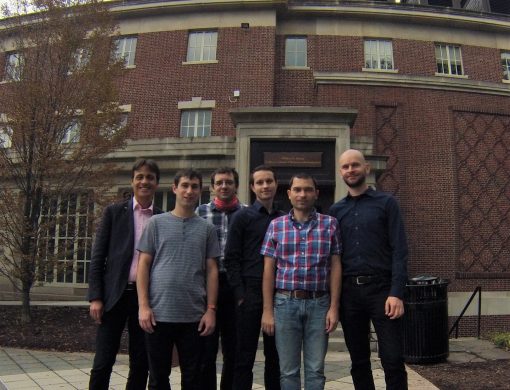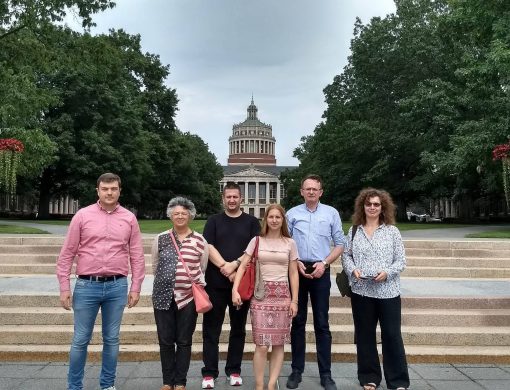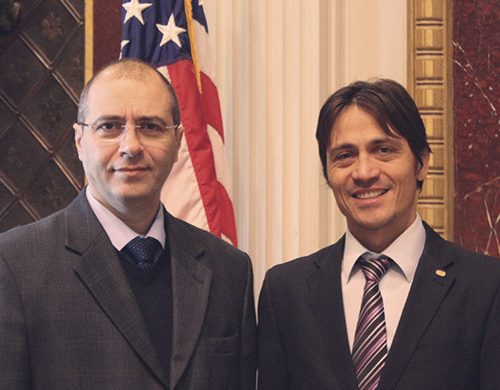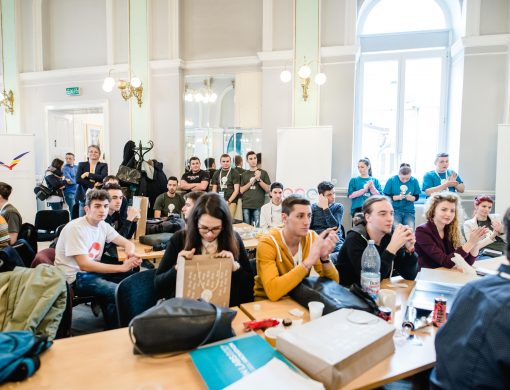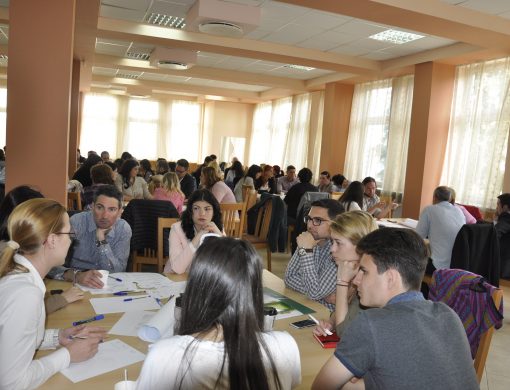Preparing future generations for the swiftly changing High Tech economy requires education systems to be adept to and in tune with the demands of industry today, while simultaneously preparing for the needs of tomorrow.
As more technical universities throughout Romania begin prioritizing entrepreneurial activities and education for their student bodies, the Romanian-American Foundation seeks to offer those institutions the assistance needed to meet their goals.
Text publisherd in RAF’s 2017 Annual Report
RAF’s work under the Technology and Innovation strategy is used at the pre-university level to grow the number of students who apply to the sciences and engineering universities. By increasing the ”friendliness” of the delivery of physics and math, and making the courses more experiential, students are more likely to follow that path. Once enrolled in university, they should benefit from an educational offer that matches market requirements. This is why, simultaneously, RAF works with universities to assist them in expanding the numbers of classes and services that support student entrepreneurship.
In order to expose Romanian professors to the cutting-edge educational models that include entrepreneurship in all studies, RAF has partnered with the Fulbright Commission to facilitate that experience. Through the Fulbright-RAF scholar Award program, selected university professors of technical studies spend a semester in the United States, at the University of Rochester’s Ain Center for Entrepreneurship. The University of Rochester was specifically selected not only for the performance of the entrepreneurial center, but also because the community was a big company town dependent on a small number of pillar industries that suddenly crashed. In over two decades, Rochester was able to pivot and focus on entrepreneurship as a means for economic recovery.
To date, twelve professors have participated in the program from university centers around Romania, with another six ready to leave in the Fall Semester. The purpose of the program is to engage universities by providing exceptional learning experiences in the U.S. while maintaining continuous communication and feedback with their administrators. University administrators later join their professors in Rochester for a one-week study visit where they encounter three distinct innovation ecosystems including Rochester, NY; Boston, MA; and Washington DC.
“Today, we’re thinking broadly at how to best affect students in their educational experience. Not only are we providing students new cross-faculty entrepreneurship classes, but we’re also addressing the need to train professors in the use of modern teaching techniques in delivering their curricula”, explains Mihai Gîrțu, the Pro Rector from the Ovidius University in Constanța. Mr. Gîrțu was explaining his University’s entrepreneurship strategy while addressing a group of university professors and administrators at the Polytechnic University in Bucharest this past January. Upon his return, Professor Costin Sorici was able to provide valuable input into the Ovidius strategic plan for entrepreneurship. It’s been one and a half years since he spent his semester at the University of Rochester and the results have been overwhelming.
Since his return, the Ovidius University has applied a three-pillar strategy aimed at: 1. Entrepreneurship in Education, where the aim is to provide upwards of 10% of the student body with entrepreneurship instruction and 100% with soft skills training. Also, they will provide training to current and future professors. 2. Entrepreneurship in Research, seeking to train researchers and students on intellectual property protection, technology transfer, and start-ups. 3. Entrepreneurship and Social Engagement, the pillar designed to train academics and students in service to community and NGO management. The new strategy effectively repositions the Ovidius University within the community, transforming the institution into an enabler of positive change.
Through our partners at Tech Lounge, the Innovation Labs pre-accelerator program has expanded from Bucharest to four new university centers including Iași, Sibiu, Cluj, and Timișoara. Innovation Labs creates a unique learning environment for students to work together to develop products and services. Harnessing the innovation ecosystem, Innovation Labs gathers sponsors, alumni volunteer mentors, professors, and students to provide selected teams with a two-month entrepreneurial experience that culminates in a final demo day where the best are selected. With each passing year we’ve seen the complexity of the proposed products or services increase through additional layers of interdisciplinary collaboration. Currently, students are proposing to develop solutions to healthcare problems, providing retailers with improved services for their clients, opting to create new solutions to the fluctuations in blockchain currencies, using sensors to assist bee keepers, and working in pilot cities to improve public services.
A number of universities, with passionate professors and administrators with foresight, are taking the lead in pivoting their universities in becoming entrepreneurial community hubs. Junior Achievement Romania (JAR) offers university administrators the technical assistance necessary to apply the European Commission and the OCED-developed Higher Education Innovate assessment tool to better assess how entrepreneurial their universities are. JAR has provided acute support to eight Universities nationally with application and interpretation of the assessment, while also including private sector representatives to contribute to establishing a clear baseline and determining potential new policies for each university.
Currently, Romanian universities and the communities that host them are facing a diverse array of challenges, including the need for increased innovation, performance, and employability of their graduates. Universities willing to include entrepreneurial strategies to their development goals may represent a solution to these challenges. Acting together with their communities, universities may succeed in bringing innovation to the teaching system and the courses provided to students. In addition, they may garner increased collaboration with the business sector that could result in the active involvement of volunteers in practical activities developed in entrepreneurial hubs as well as in research and innovation projects. As the ecosystem grows and becomes increasingly interconnected, there is a developing bond between peers that contributes to the overall sense of possibility and the proactive initiatives that effect change.




